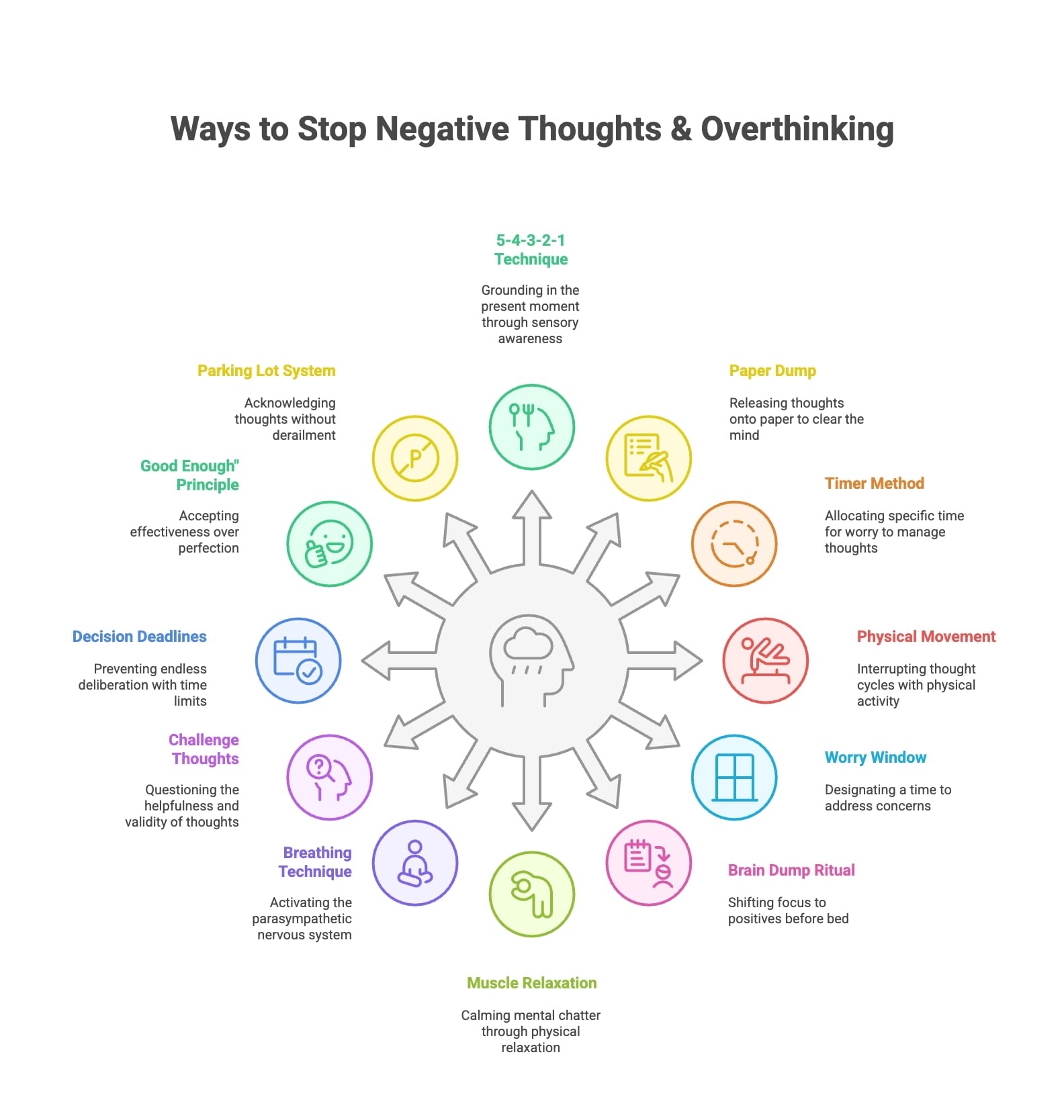
Amaha / / / How to Stop Overthinking and Negative Thoughts: Therapist Approved Strategies
ARTICLE | 7 MINS READ
How to Stop Overthinking and Negative Thoughts: Therapist Approved Strategies
Published on
27th Jun 2025

Dr Parul Mathur
MD Psychiatry

“Overthinking is like a mental hamster wheel, it keeps you running but gets you nowhere,” says Dr. Khushboo Kansal, a renowned psychiatrist based in Amaha, Delhi clinic.
It's 2 AM, and your brain refuses to shut up. Maybe you're replaying that awkward conversation with your boss, wondering if you should've taken that other job offer, or not spoken rudely with your mother . We've all been there.
I remember lying awake last month, obsessing over whether I had offended my neighbor by not inviting her to our small celebration at home. My mind kept spinning: should I apologize? Was she really upset? Did I overthink her reaction? The irony wasn't lost on me.
But here's the thing about overthinking: it's not just an occasional nuisance. For many of us, it's become a default mode that affects our sleep, relationships, and overall well-being.
What Exactly Is Overthinking?
Before we get into how to stop overthinking, let’s figure out if you’re actually doing it. Overthinking isn't just careful consideration, it isn’t just thinking a lot as well, it’s when your mind gets stuck in a loop, analysing every detail to death.

Want more Support than just Tips and Resources?
Book a 30 mins Coach Call with our Care team to get personalised Support
Signs You're Caught in the Overthinking Trap
Sometimes we don't even realize we're overthinking. Here are the telltale signs:
Mental Signs:
- You create elaborate scenarios that probably won't happen
- You second-guess decisions you've already made
- You replay conversations and scenarios over and over in your head
- You’re constantly imagining worst-case scenarios, like failing an exam or missing a work deadline
Physical Signs:
- Difficulty falling asleep
- Tension headaches
- Stomach knots
- Restlessness
Behavioural Signs:
- Procrastinating on important decisions
- Asking the same question to multiple people
- Avoiding situations that trigger your overthinking
Recognising these patterns is half the battle. Once you know what overthinking looks like in your life, you can start addressing it.
The Dark Side: Signs of Negative Overthinking
Not all overthinking is created equal. There's a difference between thoughtful analysis and destructive rumination. Negative overthinking has its own warning signs:
- Catastrophizing: Assuming the worst possible outcome
- Mind reading: Believing you know what others are thinking
- All-or-nothing thinking: Seeing everything in black and white
- Emotional reasoning: Taking your feelings as facts
For instance, if you don't get a reply to your WhatsApp message immediately, negative overthinking might make you conclude that the person is angry with you, planning to end your friendship, or that you're fundamentally unlikable. Does this ring a bell?
Why Does Overthinking Happen mainly at Night? - Science-backed Reasons
The world gets quiet at night, but your brain decides it’s time to host a full-on debate? Here’s why this happens. First, there’s no daytime bustle to distract you: no office calls, no street vendors, just you and your thoughts. Your brain, free from tasks, starts digging up worries, like that comment your colleague made or whether you’ll impress at tomorrow’s family function. Second, fatigue plays a role. By night, your mental filters are worn out, so negative thoughts sneak in easier. And let’s not forget biology, cortisol levels, which regulate stress, can stay elevated if you’ve had a hectic day, keeping your mind buzzing.
In Indian homes, where we often stay up late for family duties or binge-watching Netflix, the lack of a proper wind-down routine makes it worse. To tackle this, try dimming the lights an hour before bed—it signals your brain to relax. Or sip some warm milk with turmeric, a desi classic that soothes. Writing down tomorrow’s tasks can also trick your mind into letting go.
How to Stop Overthinking at Night
Create a Worry Window Designate 15 minutes earlier in the evening to address your concerns. When bedtime worries arise, remind yourself you've already handled them.
The Brain Dump Ritual Before bed, write down three things that went well today and three things you're grateful for. This shifts your focus from problems to positives.
Progressive Muscle Relaxation Tense and release each muscle group, starting from your toes and working up. This physical practice calms your mental chatter.
The 4-7-8 Breathing Technique Inhale for 4 counts, hold for 7, exhale for 8. This activates your parasympathetic nervous system, telling your body it's time to rest.
I've found that consistency matters more than perfection with these techniques. Even if your mind wanders, gently bring it back to the practice.
Immediate Ways to Stop Overthinking Right Now
When you catch yourself spiralling, try these quick fixes:
The 5-4-3-2-1 Technique Name 5 things you can see, 4 you can touch, 3 you can hear, 2 you can smell, and 1 you can taste. This grounds you in the present moment.
The Paper Dump Write down everything you're thinking about. Don't worry about grammar or making sense. Just get it out of your head and onto paper.
The Timer Method: Set a timer for 5 minutes and allow yourself to worry. When it goes off, move on to something else. You've given your concerns their due time.
Physical Movement: Do 10 jumping jacks, take a walk around your building, or do some stretches. Physical activity interrupts the overthinking cycle.
Let me share something that worked for me: I keep a small notebook by my bed. When thoughts start racing at night, I write them down and tell myself, "I'll deal with this tomorrow." It's like making a mental appointment with your worries.
Practical Strategies to Stop Overthinking Long-Term
Quick fixes are great, but lasting change requires deeper strategies:
Challenge Your Thoughts Ask yourself: Is this thought helpful? Is it based on facts or assumptions? What would I tell a friend in this situation? Often, we're much kinder to others than ourselves.
Set Decision Deadlines Give yourself a specific timeframe to make decisions. Whether it's choosing a restaurant or changing careers, having a deadline prevents endless deliberation.
Practice the "Good Enough" Principle Perfectionism fuels overthinking. Sometimes, good enough really is good enough. That presentation doesn't need to be flawless; it just needs to be effective.
Develop a "Parking Lot" System When intrusive thoughts arise during important tasks, write them in a "parking lot" list to address later. This acknowledges the thought without letting it derail you.
The Power of Mindfulness in Breaking Overthinking Patterns
Observation Without Judgment Instead of getting caught up in thoughts, you learn to observe them like clouds passing in the sky. They're there, but they don't define your day.
Present-Moment Awareness Overthinking often involves dwelling on the past or worrying about the future. Mindfulness brings you back to now, where you actually have control.
Creating Space Between Thoughts and Reactions You don't have to act on every thought. Mindfulness teaches you that thoughts are just mental events, not commands.
Try this simple exercise: When you notice overthinking starting, pause and ask yourself, "What am I thinking right now?" Often, just naming the thought reduces its power.
Building Your Overthinking Prevention Toolkit
Creating sustainable change means having multiple strategies at your disposal:
Morning Routine Start your day with intention rather than anxiety. This might include meditation, journaling, or simply enjoying your chai without checking your phone.
Evening Wind-Down Create a buffer between your day and sleep. This could involve reading, gentle stretches, or listening to calming music.
Weekly Check-Ins Set aside time each week to review your thoughts and feelings. Are there patterns? What triggered your overthinking episodes?
Social Support Don't underestimate the power of talking to someone you trust. Sometimes, external perspective can break us out of our mental loops.

When Overthinking Becomes a Bigger Problem
While everyone overthinks occasionally, persistent rumination might indicate underlying issues like anxiety or depression. If your overthinking:
- Interferes with daily activities
- Causes significant distress
- Doesn't respond to self-help strategies
- Includes thoughts of self-harm
Remember, seeking help isn't a sign of weakness - it's a sign of wisdom. Just like you'd see a doctor for a physical ailment, mental health deserves the same attention. Therapists from Amaha can help you put all this knowledge into practice and help you put a complete stop to your overthinking habits.
How Therapy Can Help You Stop Overthinking
Therapy offers structured approaches like CBT and ACT to break overthinking patterns through personalized coping strategies and skill-building exercises. Unlike self-help, therapists provide tailored guidance, weekly practice assignments, and culturally sensitive support. Modern therapy is practical and accessible through online sessions, helping improve relationships, sleep, and decision-making confidence beyond just stopping overthinking habits.
Your Journey Forward
Breaking the overthinking habit isn't about never having another worried thought. It's about changing your relationship with those thoughts. Some days will be better than others, and that's completely normal.
The key is patience with yourself. You're rewiring patterns that might have been years in the making. You've got this. Really. The fact that you're reading this shows you're ready to make a change. That awareness alone is the first step toward a calmer, more peaceful mind.

Find Top-Rated Therapists who can help you Stop Overthinking
Learn to Stop Negative Thoughts
Frequently Asked Questions
Q1: How long does it take to stop overthinking?
There's no fixed timeline, but most people notice improvement within 2-4 weeks of consistent practice. Some strategies work immediately for acute episodes, while building long-term resilience takes time. The key is consistency rather than perfection.
Q2: Is overthinking linked to anxiety disorders?
Yes, chronic overthinking can be a symptom of anxiety disorders, depression, or OCD. However, occasional overthinking is normal. If it significantly impacts your daily life, relationships, or sleep for more than a few weeks, consider consulting a mental health professional.
Q3: Can meditation really help with overthinking?
Research shows that regular meditation reduces activity in the default mode network of the brain, which is associated with rumination and overthinking. Even 10 minutes of daily meditation can make a noticeable difference over time.
Q4: Why do I overthink more at night?
At night, there are fewer distractions, making it easier for your mind to wander. Additionally, fatigue can reduce your ability to regulate thoughts effectively. Creating a bedtime routine and addressing worries earlier in the day can help significantly.
Q5: What's the difference between problem-solving and overthinking?
Problem-solving is goal-oriented and leads to action or resolution. Overthinking is repetitive, focuses on problems rather than solutions, and often involves scenarios that may never happen. If you're not moving toward a solution after 15-20 minutes of thinking, you're likely overthinking.
Was this article helpful?
Yes
No
If you didn't find what you were looking for, please reach out to us at [email protected] or +912071171501. We're here for you - for anything you might need.



Build a good life for yourself
with Amaha
Best App
for Good
on Google Play India

